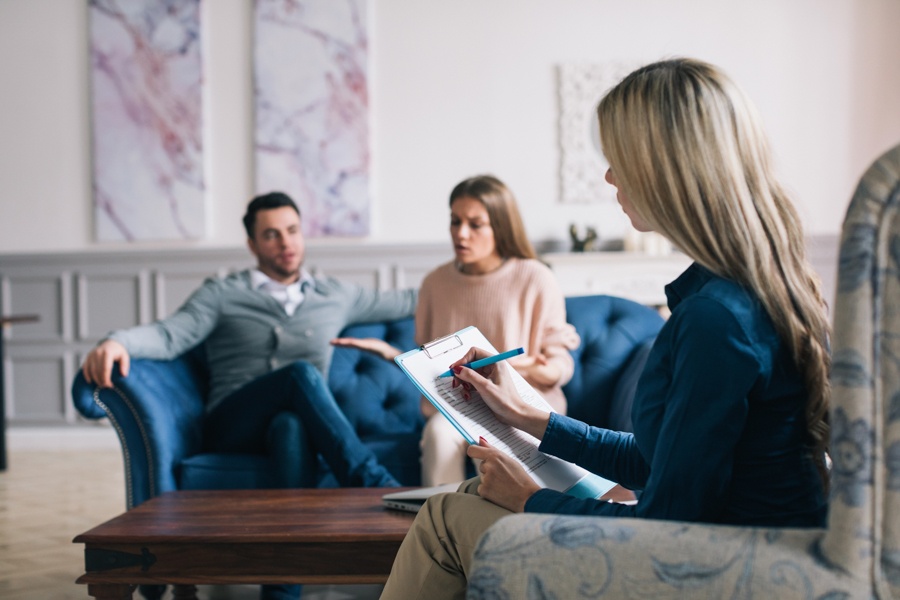There are many avenues to travel in the addiction treatment space. Some methods include more intensive care like inpatient residential treatment, while others may approach addiction holistically. Regardless, it is important to seek out unique care that fits the needs of the individual first. For those struggling in their relationship because of substance abuse, couples therapy for addiction could be the right step to take.
What is Couples Therapy?

Couples therapy can be beneficial for all types of relationships, including married couples, same-sex partners, and dating or engaged couples. It can also be used to help couples prepare for marriage and strengthen their relationship before exchanging vows. In some cases, it may even help prevent divorce or separation.
Couples therapy for addiction is a form of counseling that helps couples or families cope with the effects of substance abuse and recover from its associated issues. Through this type of therapy, couples can learn to do the following:
- How to recognize triggers and warning signs of relapse
- How to constructively communicate their feelings and needs to each other
- Manage any conflict that may arise during their recovery journey
Couples therapy for addiction also helps with the emotional, mental, and spiritual healing of the couple. In addition to this, it can help identify the underlying causes of the addiction and help to develop more positive coping strategies. In couples therapy for addiction, partners can work through any issues that are preventing them from living healthy lives.
How Does Addiction Impact Intimate Relationships?
Intimate relationships are one of the most important aspects of life and can be a source of great joy. Unfortunately, addiction can have serious negative impacts on these relationships. When someone is suffering from an addiction, they may prioritize their substance use over their partner. They’ll neglect to communicate and neglect other important aspects of the relationship. This can lead to feelings of resentment, mistrust, and insecurity.
The person with the addiction may also become irritable or aggressive when confronted about their behavior. This can damage the trust and connection between them and their partner. These strained relationships can lead to withdrawal from activities that were once shared together, further exacerbating the disconnection. Additionally, finances can be strained due to money spent on the addiction and a lack of attention to other financial responsibilities.
It can be extremely difficult for those in an intimate relationship with someone who is battling an addiction, but seeking help from counselors, therapists, or support groups can aid in restoring balance and communication. It is also important for both partners to maintain their own integrity, self-respect, and boundaries throughout the process. With patience and understanding, it is possible to build a strong relationship that can help both parties overcome their struggles.
Addiction and Sex Life
Substance Use Disorder (SUD) can have a serious impact on an individual’s sex life, as well as the relationships they may be in. People with SUD are at greater risk of developing sexual problems. These could include difficulty maintaining arousal and satisfaction, decreased libido, and erectile dysfunction. They may also be more likely to engage in risky sexual behavior, including unprotected sex, which can lead to further health complications.
In addition to physical difficulties associated with SUD, underlying mental health issues can have a major impact on sexual function. Issues such as depression and anxiety can interfere with an individual’s ability to enjoy and engage in healthy sexual activity.
The shame and stigma that often accompanies SUD can also have a profound impact on individuals’ sex lives. People with SUD may feel embarrassed or ashamed of their behavior, leading them to avoid intimate relationships altogether. This can lead to further isolation and loneliness, creating an even more difficult situation.
The changes that occur in relationships as a result of SUD can lead to sexual difficulties. This is yet another example of how addiction is detrimental to a person’s life. Misunderstandings, lack of communication, and increased conflict may all contribute to an individual’s difficulty maintaining a healthy sex life.
Addiction and Infidelity
Substance use disorder (SUD) has been increasingly linked to infidelity. Research suggests that those with SUD are more likely to engage in infidelity than those without an addiction. This is primarily due to the altered brain chemistry that results from substance use, making it harder for the individual to resist temptation and make healthy choices. Furthermore, those engaging in substance use may be more likely to engage in risky behavior and become involved with people they would not normally associate with.
The risk of infidelity is particularly high for those suffering from SUDs due to two key factors: impaired judgment and increased impulsivity. Substance misuse impairs a person’s ability to make sound decisions, as well as their ability to assess the consequences of their behavior. This can lead to a person engaging in risky activities such as infidelity more often than they would normally do so. Furthermore, substance use increases impulsivity, which can make it easier for people to act on an impulse and become involved in affairs without considering potential repercussions.
What Do I Do If My Partner Has an Addiction?
If your partner has an addiction, the most important thing you can do is be there for them. Offer to listen and provide support and understanding as they work through their addiction. Encourage them to seek professional help such as therapy or a recovery program if needed. Remind your partner that you are in it together and that you will do whatever you can to help them succeed.
You can also take steps to create a supportive environment for your partner. This means not enabling their addiction or using drugs or using alcohol in the presence of your partner. Additionally, activities that may trigger their addiction are important to actively avoid. For example, you could be invited to a party where drinking is involved; if that is the case it’s imperative to take the right steps to ensure your partner is not uncomfortable doing that.
It’s important to take care of yourself too. Make sure you practice self-care and have a strong support system of friends, family members, and professionals who can help you. Seek out resources such as addiction support groups that can provide additional guidance and advice.
How to Recognize When Partners Need Support
If your partner has an addiction, it is important to consider whether intervention is necessary. Intervention can be key in helping a person struggling with an addiction to get the help they need and make positive changes in their lives. It allows those close to them to support them while also being honest and direct about how their behavior is affecting everyone involved. If your partner is resistant to getting help, intervention can be an effective way of encouraging them to seek treatment.
How to Recognize Signs of Enabling
Enabling is a pattern of behavior that can be detrimental to an individual or the relationship between two people. It’s important to recognize the signs of enabling so you can make changes and create healthier relationships.
Signs of enabling include the following:
- Helping another person with tasks they should be doing for themselves
- Making excuses for someone’s behavior
- Trying to fix the other person’s problems instead of letting them take responsibility
Enabling behavior often stems from a desire to be helpful and supportive, but it can create unhealthy relationships as it prevents the individual from dealing with their own problems. It can also lead to codependency, where one person is overly dependent on the other. Enabling behavior can also make it harder for the individual to develop the necessary skills and learn from their mistakes. Additionally, it can cause resentment in a relationship if one partner feels like they are always taking care of the other.
If you recognize any of these signs of enabling in your own behavior or that of another person, it’s important to make changes to create healthier relationships. Instead of trying to fix the other person’s problems, provide support and guidance. Encourage the individual to take responsibility for their actions and allow them to experience natural consequences when appropriate.
How Can Couples Counseling Help in Addiction Treatment?
Couples counseling can be an important part of addiction treatment. In couples counseling, both partners talk openly about their addiction, their relationship, and how to move forward in a healthy way. Through this process, couples can begin to explore the underlying causes of addiction and develop strategies for dealing with them.
Free by the Sea Offers Couples Therapy and Marital Counseling for Addiction Treatment
At Free by the Sea, we offer comprehensive treatment for substance use disorder. This means providing resources optimized for a person’s unique circumstances. If your partner is suffering from substance use disorder, couples therapy for addiction treatment might be for you. For more information, you can contact us here.

Dr. Richard Crabbe joined our team in 2019 as our psychiatrist and medical director. He attended the University of Ghana Medical School where he became a Medical Doctor in 1977. From 1978 through 1984, he was a medical officer in the Ghana Navy and provided a variety of services from general medicine to surgeries. He received his Certificate in General Psychology from the American Board of Psychology and Neurology in 2002.



